A cycle tour of the logistic challenges on campus
If you stand on Mekelweg for fifteen minutes during morning rush hour, you will count about 800 bikes racing by. And then there are the cars. There are parking spaces on campus for more than 4,000 vehicles. A total of approximately 25,000 students, staff and visitors can be found on the TU Delft campus every day. This number is only set to rise in the years ahead, meaning that there is no shortage of challenges when it comes to mobility and accessibility. Time for a cycle tour with Programme Manager Marc Numann*, to explore the current logistical challenges.
“This is where everything joins up”, says Numann, pointing to a busy junction. We are standing where Mekelweg and Jaffalaan intersect. Nearly every student arriving from the city centre cycles along Mekelweg. A few years ago, a new route across the Abtswoudsebrug was completed, making it easier for cyclists to reach the campus from Delft Station. As a result, two major flows of cyclists now meet at this crossing. It has become so busy that TU Delft introduced traffic controllers for a while. “That helped prevent accidents involving cars and cyclists”, the Programme Manager explains.
Reducing cycle traffic on Mekelweg is one of the logistical challenges facing TU Delft. The central artery of the campus increasingly needs to become the domain of pedestrians.
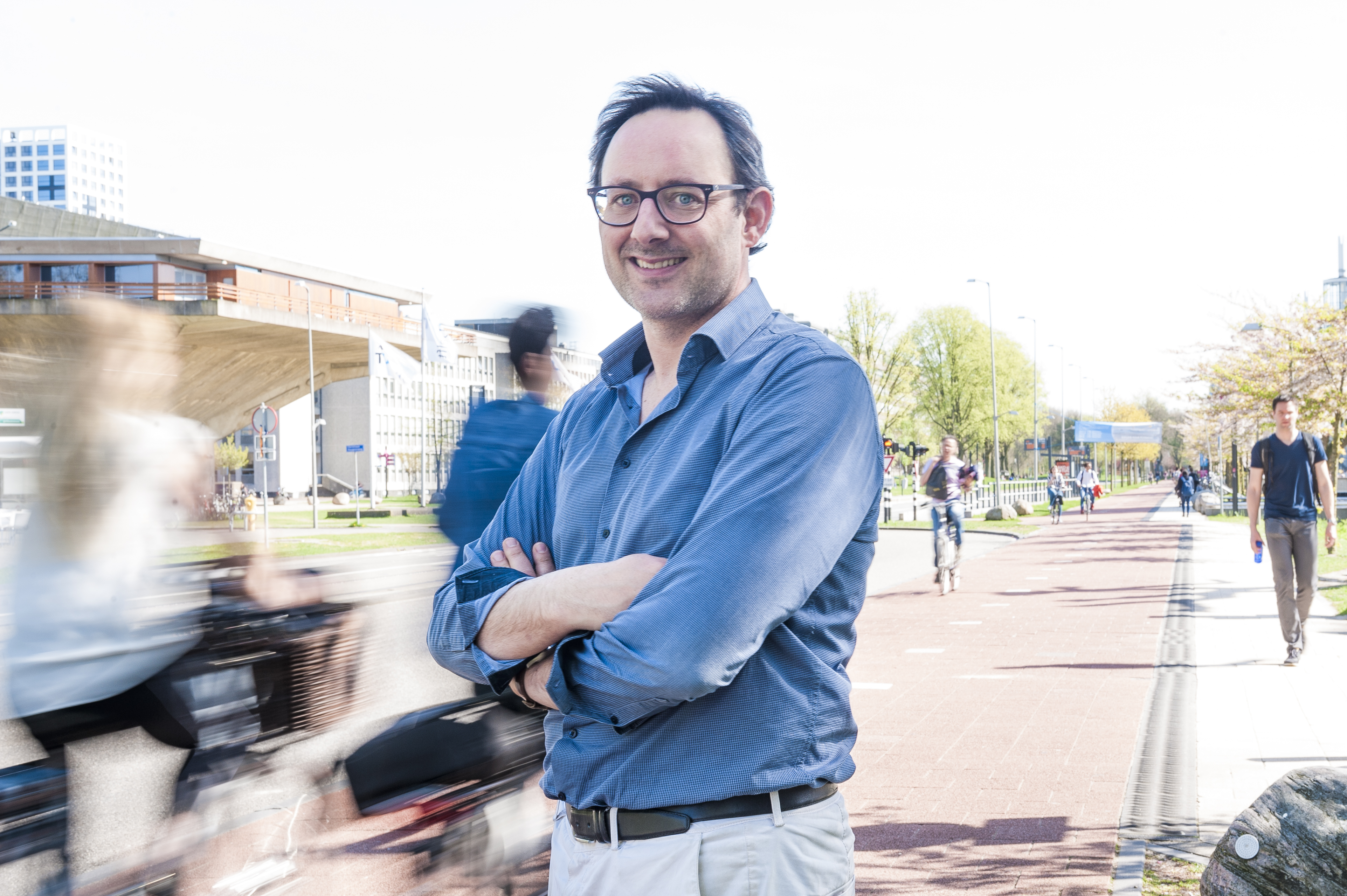
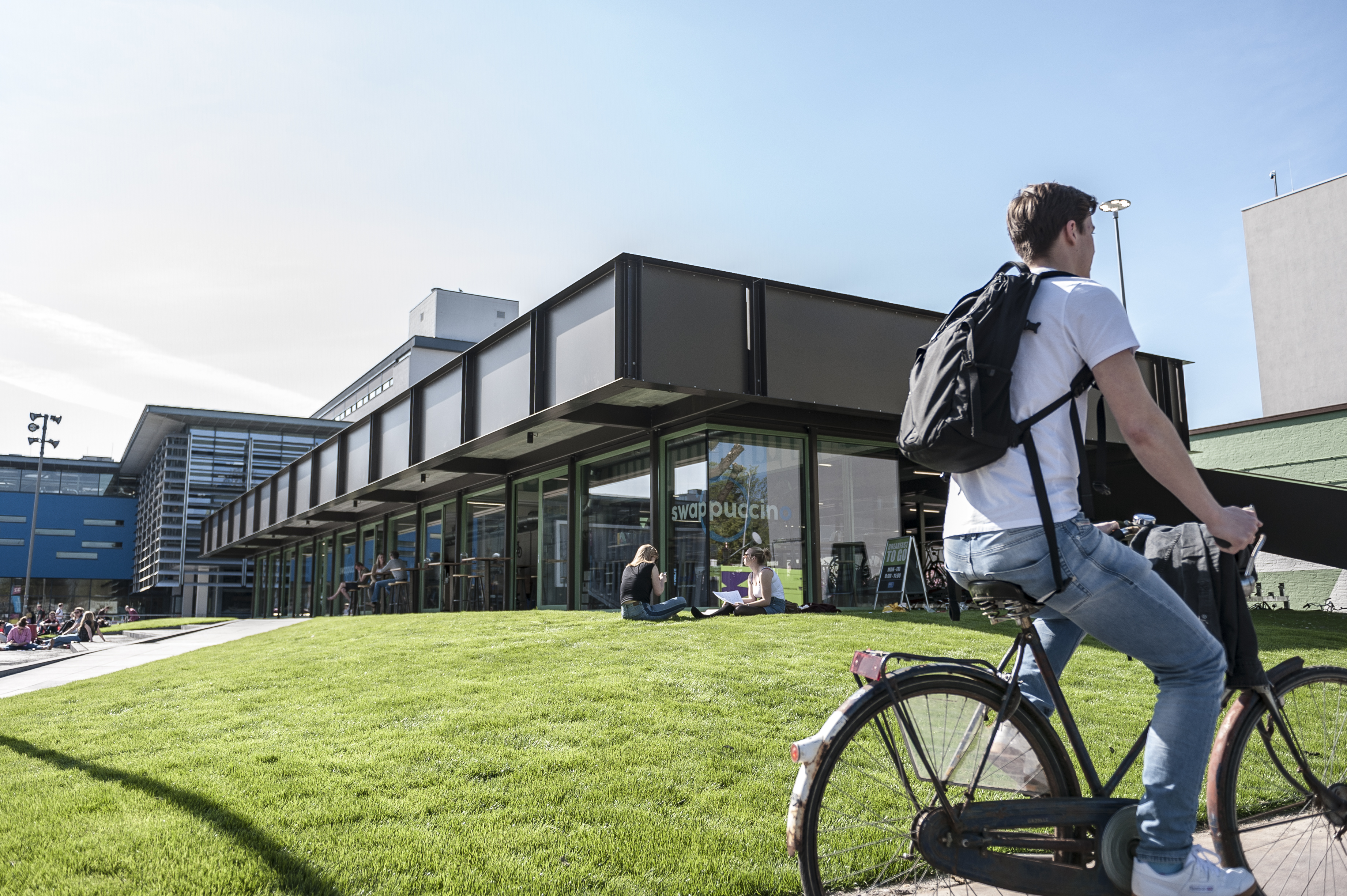
Walking, cycling, and lazing in the grass
The square in front of the Faculty of Design Engineering and the Pulse teaching building is a symbol of how the heart of the campus should eventually look. We cycle there to see it for ourselves. “As you can see, numerous functions come together here”, Marc Numann explains. The weather is great. Students stroll about, lie on the grass or enjoy a drink on the terrace. A student cycles past every now and then – hardly surprising really, as a large cycle parking area has been built next to the square. It can take around 1,850 bikes.
A bike repair workshop is located next to the parking area. While your bike gets repaired, you can even grab a drink at the coffee bar next door.
Relocating cycle traffic
Cycle traffic is gradually moving away from Mekelweg to other cycle routes, such as Leeghwaterstraat. This street used to have lots of parking spaces, really forming the edge of the campus. Those parking spaces have now been replaced by a straight and well-organised bike path which is now being used by students. “You can cycle unobstructed here, which is great, and the entrances to the faculties are close by, plus there’s also an area to park your cycle. Those are the main reasons for choosing a particular cycle route”, Marc says.
Leeghwaterstraat certainly makes for pleasant cycling. We bike past the cogeneration plant; there’s a car park next to it. TU Delft has been working on new parking policies recently. The many small car parks dotted around the campus are being reduced to six large car parks, situated on the edges. Everywhere on campus will be within walking distance of one of these car parks. A dynamic signage system will help anyone find an available parking space quickly. The number of occupied spaces will be monitored using an access control system. All locations will be equipped with this system. This will be done gradually, in line with the spatial development of the campus. TU Delft’s aim is to ensure that the campus car parking spaces remain available to staff members, students and tenants of TU Delft, and to visitors to the TU Delft campus.
Marc: “Lots of vehicles are on campus looking for parking spaces. It’s difficult to find an available space so not all parking spaces are being used optimally. By creating larger and better car parking facilities on the edges of the campus, cars will be less of a fixture on the campus itself.” A first step is to offer drivers dynamic parking information. As part of the new parking policy, matrix signs showing real-time information on the number of available parking spaces in the various car parks will be located along the Campus Ring Road. This will reduce congestion caused by people looking for parking.”
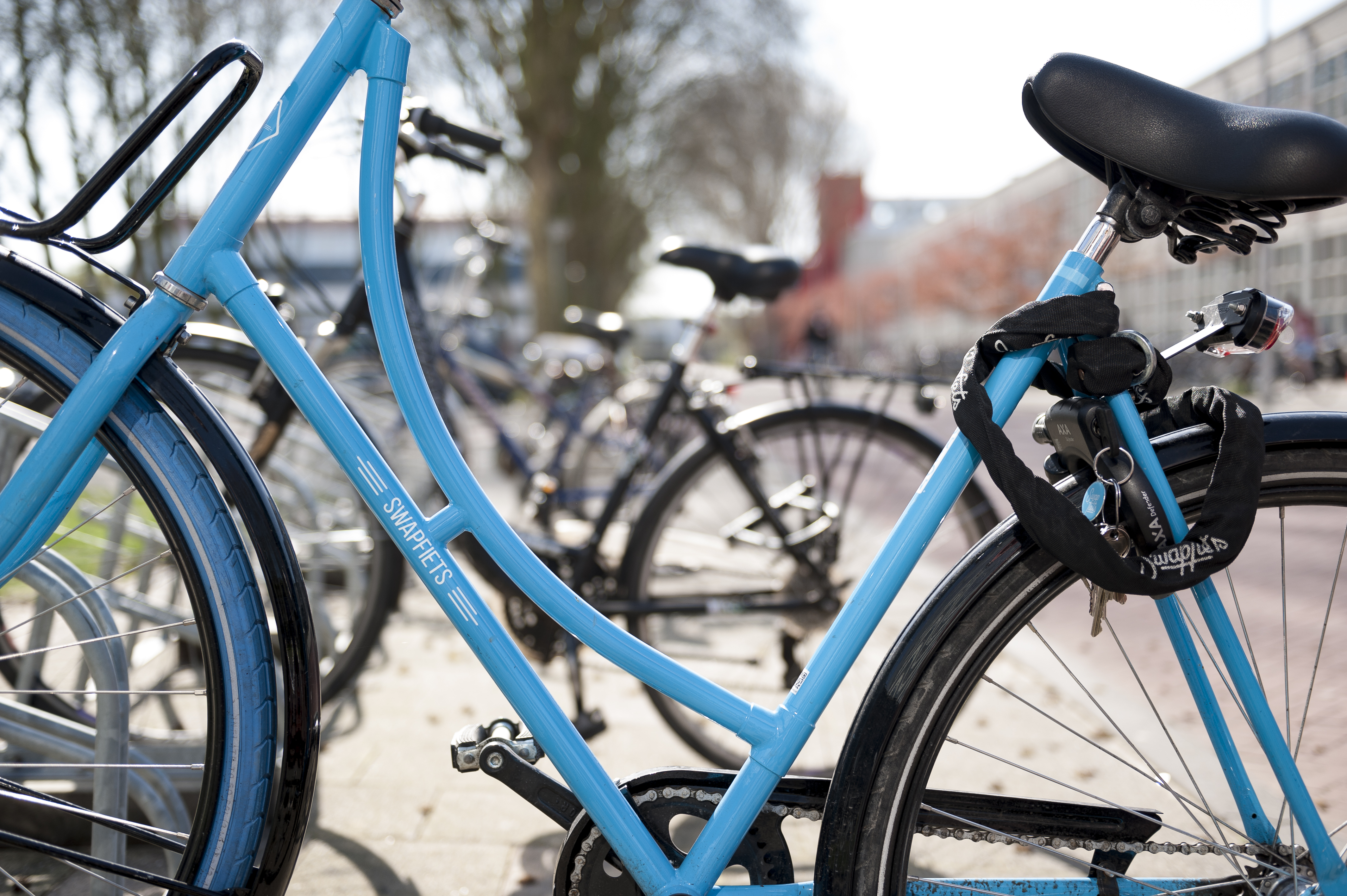

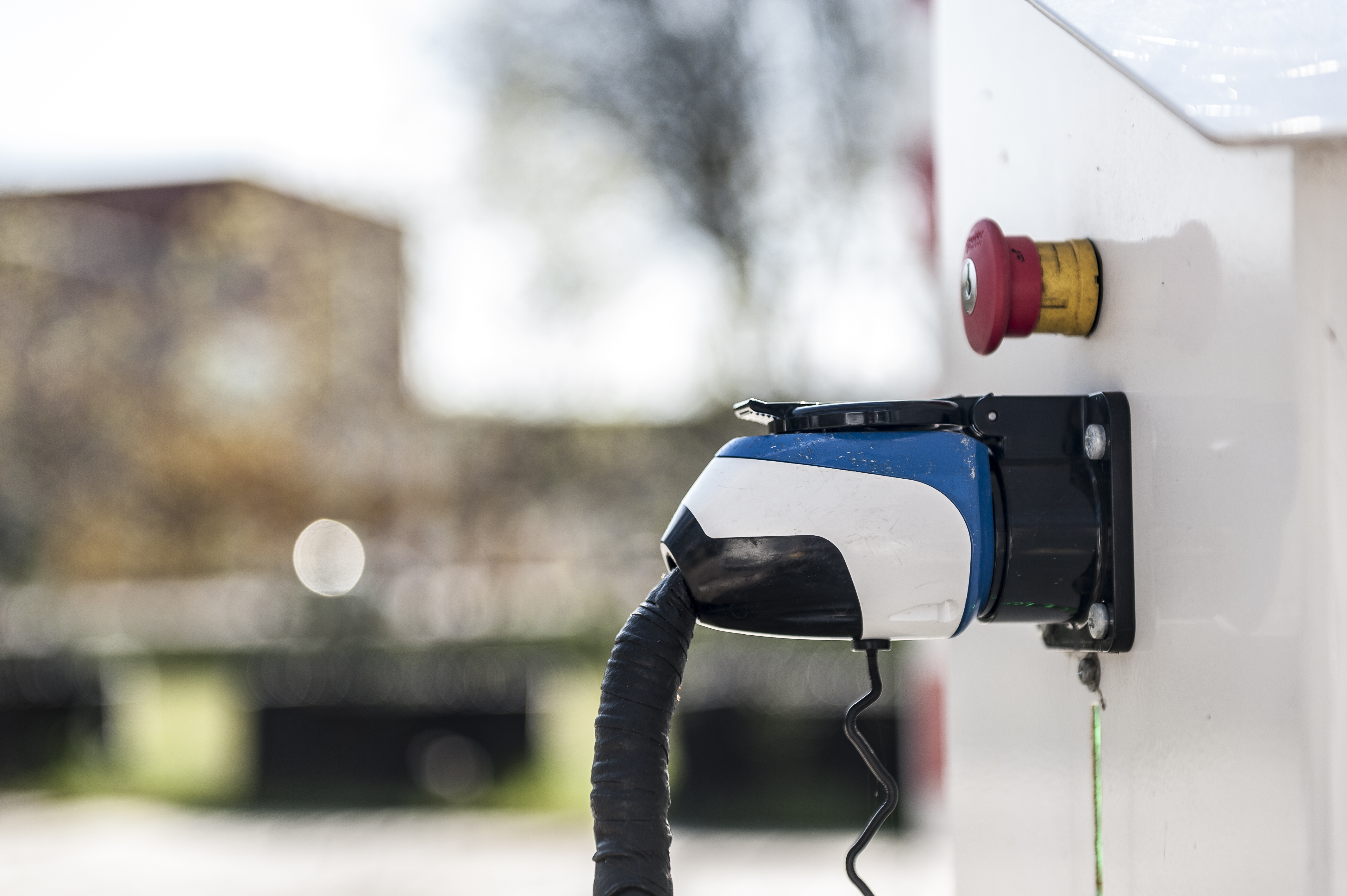
In terms of sustainability, the intention is to discourage people from using the car. Certainly when they travel in cars that run on fossil fuels. There are currently fourteen charging points for electric cars. This number is set to increase dramatically. Marc drives to work, but moves around campus on foot or by bike during the day. TU bikes and Bondi bikes are available. The Bondi bikes are a pilot bike-sharing project for staff. You use an app to locate a bike, unlock it and cycle off to where you need to be. Once at your destination, you leave the bike for the next user.
Living Lab
We continue south, to The Green Village, where experimental research into sustainability is the order of the day. And this of course includes sustainable mobility. The Green Village features a prototype of the Hyperloop, for example: this is a tube that enables transport in a vacuum, in other words: no resistance, and therefore little energy requirement. Elsewhere in The Green Village, a car is parked under a solar-panel carport. The car is charged directly via the roof, without having to make use of the electricity grid. Tests are also being conducted with driverless (autonomous) transport. The Green Village is the ideal place for testing out such initiatives; it is a living lab. The ultimate aim is to implement the new techniques and principles in “real” situations. “Autonomous transport could be the answer to the accessibility issues, especially for the companies on the outskirts of the campus”, Marc says philosophically. “Wouldn’t that be great?”
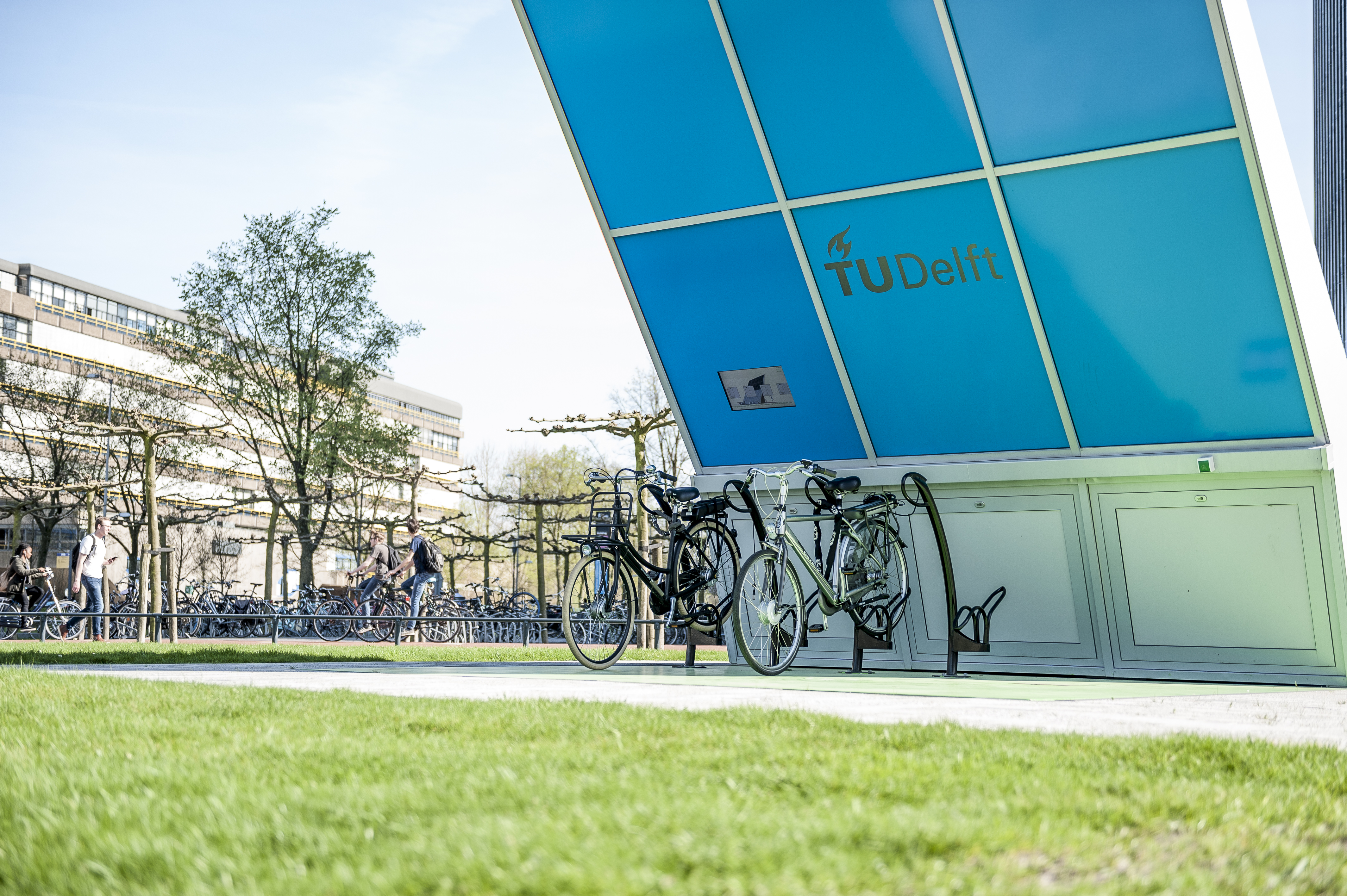
Facts and figures
- An average of 800 cyclists use Mekelweg every fifteen minutes during rush hour.
- There are about 11,000 bikes on campus every day.
- Some 3,500 cars are parked in spaces on campus every day.
- There are 16 charging points for electric cars. This number will have to increase to 240.
- The present individual parking spaces will be replaced by five or 6 large parking locations on the campus ring road.
Guiding principles for the Mobility and Accessibility Programme
- Focus on pedestrians at the heart of the campus.
- Encourage cyclists to use new routes to reduce burden on Mekelweg.
- Drivers to park on the outskirts of the campus.
- Discourage non-sustainable transport and offer sustainable alternatives.
* Marc Numann was Programme Manager for Mobility and Accessibility at TU Delft. Richard de Lange has since taken over this job from him. The Programme Manager works on developing an integral approach to the issue of mobility. After all, mobility touches upon everything that happens on campus.
